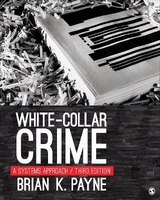
White-Collar Crime
SAGE Publications Inc (Verlag)
978-1-5063-4477-5 (ISBN)
- Titel erscheint in neuer Auflage
- Artikel merken
White-Collar Crime provides a theoretical framework and context for students and explores such timely topics as crimes in health care and educational systems, crimes by criminal justice professionals and politicians, corporate crime, environmental crime, and more. In Focus box inserts and follow-up discussion questions bring concepts to life and allow for further examination and critical thinking.
Brian K. Payne received his doctorate in criminology from Indiana University of Pennsylvania in 1993. He is currently the vice provost for academic affairs at Old Dominion University, where he is tenured in the Department of Sociology and Criminal Justice, and the chair of the Hampton Roads Cybersecurity Education, Workforce, and Economic Development Alliance. He is a former editor of the American Journal of Criminal Justice, past president of the Academy of Criminal Justice Sciences and past president of the Southern Criminal Justice Association. Payne is the author or coauthor of more than 160 journal articles and seven books including White-Collar Crime: The Essentials (Sage), Family Violence and Criminal Justice (Elsevier, with Randy Gainey), and Crime and Elder Abuse: An Integrated Perspective (Charles C Thomas). He won the local Pinewood Derby when he was in the fourth grade.
Chapter I: Introduction and Overview of White-Collar Crime: A Systems Perspective
Why Study White-Collar Crime?
Researching White-Collar Crime
Studying White-Collar Crime From a Scientific Perspective
The Student Role in White-Collar Crime
Plan for the Book
Chapter II: Understanding White-Collar Crime: Definitions, Extent, and Consequences
White-Collar Crime: An Evolving Concept
Modern Conceptualizations of White-Collar Crime
Extent of White-Collar Crime
Consequences of White-Collar Crime
Public Attitudes Toward White-Collar Crime
Characteristics of White-Collar Offenders
Chapter III: Crimes in Sales-Related Occupations: A Systems Perspective
Employee Theft in the Retail System
Crimes in the Entertainment Services System
Fraud in the Sales/Service System
Crimes in the Insurance System
Chapter IV: Crimes in the Health Care System
Fraud by Doctors
Unnecessary Surgery
Medication Errors
General Offending by Doctors
Fraud by Pharmacists
Drug Use by Pharmacists
Sexual Abuse
Elder Abuse by Health Care Workers
Home Health Care Fraud
Durable Medical Equipment Fraud
Medical Malpractice
Chapter V: Crime in Systems of Social Control: White-Collar Crime in Criminal Justice, Political, and Religious Systems
Crimes in the Criminal Justice System
Crimes in the Political System
Crimes by Officials in the Religious System
Chapter VI: Crimes in the Educational System
Crimes by Professionals in the Educational System
Pecuniary-Oriented Offenses
Sexual Harassment
Disciplining Professors
Crimes in the Educational System by Students
Chapter VII: Crime in the Economic System
Crime in the Economic System
Investment Fraud
Ponzi and Pyramid Schemes
Patterns Surrounding Investment Fraud
Student Loan Fraud
Chapter VIII: Crime in the Cyber System
Conceptualizing Crime in the Cyber System
Types of Cybercrime
Characteristics of Cybercriminals
Costs of Cybercrime
Responding to Cybercrime
Chapter IX: Crimes in the Housing System
Mortgage Fraud
Consequences of Mortgage Fraud
Patterns Surrounding Mortgage Fraud
Slumlords as White-Collar Criminals
Chapter X: Crimes by the Corporate System
Conceptualizing Corporate Crime
Types of Corporate Crime
Dynamics of Corporate Offending
Public Concern About Crimes by the Corporate System
Chapter XI: Environmental Crime
Conceptualizing Environmental Crime
Varieties of Environmental White-Collar Crime
The U.S. Environmental Protection Agency (EPA)
Problems Addressing Environmental Crimes
Chapter XII: Explaining White-Collar Crime
Culture and White-Collar Crime
Deterrence Theory/Rational Choice Theory and White-Collar Crime
Strain Theory and White-Collar Crime
Learning Theory and White-Collar Crime
Neutralizing and Justifying White-Collar Crime
Control Theory and White-Collar Crime
Self-Control Theory and White-Collar Crime
Routine Activities Theory and White-Collar Crime
Conflict Theory and White-Collar Crime
Explaining Corporate Crime
Theories Ignored in the White-Collar Crime Literature
Integrated Efforts to Explain White-Collar Crime
Systems Theory
Chapter XIII: Policing White-Collar Crime
Agencies Involved in Responding to White-Collar Crime
Law Enforcement Strategies and White-Collar Crime
Suggestions for Improving the Law Enforcement Response to White-Collar Crime
Self-Policing and White-Collar Crime
Regulatory Policing and White-Collar Crime
The Global Police and White-Collar Crime
Chapter XIV: Judicial Proceedings and White-Collar Crime
Types of Judicial Proceedings Responding to White-Collar Misconduct
The Role of Judges in Addressing White-Collar Crime
The Role of Defense Attorneys in White-Collar Crime Cases
Other Actors Involved in White-Collar Judicial Proceedings
Civil Lawsuits and White-Collar Crime
Issues in White-Collar Judicial Networking and the Judicial Process
Chapter XV: The Corrections Subsystem and White-Collar Crime
Sentencing Dynamics and White-Collar Offenders
The Prison Experience for White-Collar Offenders
The Probation and Parole Experience for White-Collar Offenders
Monetary Fines and White-Collar Offenders
Alternative Sanctions and White-Collar Offenders
Punishing Corporations for White-Collar Crime
Reasons for Punishing White-Collar Offenders
| Erscheinungsdatum | 12.08.2016 |
|---|---|
| Verlagsort | Thousand Oaks |
| Sprache | englisch |
| Maße | 187 x 231 mm |
| Gewicht | 830 g |
| Themenwelt | Literatur ► Biografien / Erfahrungsberichte |
| Recht / Steuern ► Strafrecht ► Kriminologie | |
| Sozialwissenschaften ► Soziologie ► Allgemeine Soziologie | |
| ISBN-10 | 1-5063-4477-1 / 1506344771 |
| ISBN-13 | 978-1-5063-4477-5 / 9781506344775 |
| Zustand | Neuware |
| Informationen gemäß Produktsicherheitsverordnung (GPSR) | |
| Haben Sie eine Frage zum Produkt? |
aus dem Bereich



